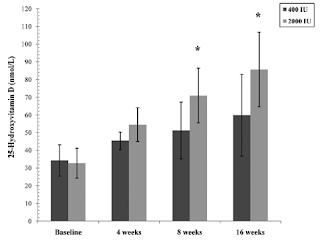16 Weeks Vitamin D @ 2.000 IU per Day Effective Against Artherial Stiffness, But Without Effect on Body Composition
Although news on possible benefits from Vitamin D supplementation crowd in on a daily basis, trials, not done with post-menopausal women, are still scarce. It is therefore worth a SuppVersity post that Dong, et. al. will publish a paper (Dong. 2010) on in the October issue of the Journal of Clinical Endocrinology & Metabolism, which investigates the effects of 16 week supplementation of 2.000 IU Vitamin D3 on 25-hydroxyvitaminD[25(OH)D] status, adiposity and arterial Stiffness in 49 Black Youths.
While supplementation did raise 25(OH)D levels by 183% (vs. 87% raise in the group that was given 400IU VitD3/day) and had beneficial effects on cardiovascular risk measured by "carotid-femoral PWV, the 'gold standard' measurement of arterial stiffness in the central vasculature (e.g. aorta)", significant improvements in body composition were not achieved.
In view of the above results, it is yet of interest that the scientists state:
In this context another recently published hypothesis on the mechanism of Vitamin D defeciency and coronary health might be of interest. Rostand in the Journal of the American Society of Nephrology (Rostand. 2010) speculates that...
 |
| Fig. 1: Vitamin D supplementation @2.000 IU raised 25(OH)D levels significantly more than supplementation @ the RDA, i.e. 400IU (Dong. 2010. Fig.1) |
While supplementation did raise 25(OH)D levels by 183% (vs. 87% raise in the group that was given 400IU VitD3/day) and had beneficial effects on cardiovascular risk measured by "carotid-femoral PWV, the 'gold standard' measurement of arterial stiffness in the central vasculature (e.g. aorta)", significant improvements in body composition were not achieved.
 |
| Table 1: Adapted from Dong. 2010 (Table 2) |
In view of the above results, it is yet of interest that the scientists state:
Nevertheless, we found that the adequacy of the treatment of 2000 IU/d for 16 wk was consistently and negatively modulated by fat mass across all the time points. Conceivably, the sequestration of vitamin D in body fat stores and the metabolism of 25(OH)D affected by adiposity could explain the differential treatment effects (31). Our results indicate that youth with greater fat mass might require higher doses of vitamin D supplementation to achieve vitamin D repletion. (Dong. 2010)Summarizing the most interesting find of the study is that doses of 400IU Vitamin D3, which are generally recommended for bone health appear to be to low to benefit from the cardiovascular effects of Vitamin D3 supplementation.
In this context another recently published hypothesis on the mechanism of Vitamin D defeciency and coronary health might be of interest. Rostand in the Journal of the American Society of Nephrology (Rostand. 2010) speculates that...
the presence of vitamin D deficiency throughout life from its earliest phases may adversely affect the microvasculature in African Americans, thereby playing a major role in the genesis and maintenance of hypertension. (Rostand. 2010)


